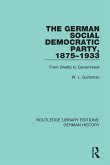Frederick Hertz
The Development of the German Public Mind
Volume 1 A Social History of German Political Sentiments, Aspirations and Ideas The Middle Ages - The Reformation
Frederick Hertz
The Development of the German Public Mind
Volume 1 A Social History of German Political Sentiments, Aspirations and Ideas The Middle Ages - The Reformation
- Broschiertes Buch
- Merkliste
- Auf die Merkliste
- Bewerten Bewerten
- Teilen
- Produkt teilen
- Produkterinnerung
- Produkterinnerung
Originally published in 1957, this study shows what the various sections of the Germans of every rank and class were thinking of the ruling men, how far they supported or opposed them, what were their wishes, hopes and fears, prejudices, ideals and standards of right and wrong. The influence of foreign thought, and parallels with the development of other nations is also discussed. The diverse sources used for research for this volume include religious and legal writings, literature, broadsheets, verses of minstrels, folk-songs and later, newspapers.
Andere Kunden interessierten sich auch für
![The Development of the German Public Mind The Development of the German Public Mind]() Frederick HertzThe Development of the German Public Mind38,99 €
Frederick HertzThe Development of the German Public Mind38,99 €![The German Public Mind in the Nineteenth Century The German Public Mind in the Nineteenth Century]() Frederick HertzThe German Public Mind in the Nineteenth Century60,99 €
Frederick HertzThe German Public Mind in the Nineteenth Century60,99 €![The Mind of the Nation The Mind of the Nation]() Egbert KlautkeThe Mind of the Nation34,99 €
Egbert KlautkeThe Mind of the Nation34,99 €![The Mind of the Nation The Mind of the Nation]() Egbert KlautkeThe Mind of the Nation146,99 €
Egbert KlautkeThe Mind of the Nation146,99 €![Hitler's Mind Hitler's Mind]() Edleff H. SchwaabHitler's Mind104,99 €
Edleff H. SchwaabHitler's Mind104,99 €![The Small German Courts in the Eighteenth Century The Small German Courts in the Eighteenth Century]() Adrien Fauchier-MagnanThe Small German Courts in the Eighteenth Century55,99 €
Adrien Fauchier-MagnanThe Small German Courts in the Eighteenth Century55,99 €![The German Social Democratic Party, 1875-1933 The German Social Democratic Party, 1875-1933]() W. L. GuttsmanThe German Social Democratic Party, 1875-193360,99 €
W. L. GuttsmanThe German Social Democratic Party, 1875-193360,99 €-
-
-
Originally published in 1957, this study shows what the various sections of the Germans of every rank and class were thinking of the ruling men, how far they supported or opposed them, what were their wishes, hopes and fears, prejudices, ideals and standards of right and wrong. The influence of foreign thought, and parallels with the development of other nations is also discussed. The diverse sources used for research for this volume include religious and legal writings, literature, broadsheets, verses of minstrels, folk-songs and later, newspapers.
Hinweis: Dieser Artikel kann nur an eine deutsche Lieferadresse ausgeliefert werden.
Hinweis: Dieser Artikel kann nur an eine deutsche Lieferadresse ausgeliefert werden.
Produktdetails
- Produktdetails
- Verlag: Routledge
- Seitenzahl: 532
- Erscheinungstermin: 1. Juli 2021
- Englisch
- Abmessung: 234mm x 156mm x 28mm
- Gewicht: 799g
- ISBN-13: 9780367245788
- ISBN-10: 0367245787
- Artikelnr.: 62151277
- Herstellerkennzeichnung
- Libri GmbH
- Europaallee 1
- 36244 Bad Hersfeld
- gpsr@libri.de
- Verlag: Routledge
- Seitenzahl: 532
- Erscheinungstermin: 1. Juli 2021
- Englisch
- Abmessung: 234mm x 156mm x 28mm
- Gewicht: 799g
- ISBN-13: 9780367245788
- ISBN-10: 0367245787
- Artikelnr.: 62151277
- Herstellerkennzeichnung
- Libri GmbH
- Europaallee 1
- 36244 Bad Hersfeld
- gpsr@libri.de
Frederick Hertz
Part 1: The Middle Ages 1. The Early Influence of Nature on the Public Mind
2. The Influence of Germanic Traditions 3. The Influence of Christianity 4.
Charlemagne's Political System 5. The Fall of the Frankish Empire 6.
Political Thought and Sentiment in the Time of the Late Carolingians 7.
Religious Revival, Cluny and Lorraine 8. Germany Under the Saxon House 9.
The Ideology of the Emperorship 10. The First Great Conflict with the
Papacy 11. The Spirit of the High Middle Ages 12. The Rise and the Fall of
the Hohenstaufens 13. Political Thought and Social Criticism in the Age of
the Hohenstaufens 14. Opinions on the Decline of the Empire 15. Social
Development and Colonisation 16. Rudolph of Habsburg and the Next-Following
Kings 17. New Political and Spiritual Struggles with the Papacy 18. The
Closing Middle Ages 19. Political Thought in the 15th Century 20. Social
Criticism in the Late Middle Ages 21. The Development of Particularism and
of the Constitutional Structure 22. The Effect of Particularism on the Law
and Social Relations 23. The Jews in the Middle Ages 24. The Rise of
National Power Politics in Europe. Maximilian I 25. Humanism and the Rise
of the Modern Spirit Part 2: The Reformation and Counter-Reformation 1.
Emperor Charles V 2. The Causes of the Reformation. Luther's Personality 3.
Luther's Attack on the Papacy and its Immediate Consequences 4. Church
Government and Social Reform in Luther's Thought 5. The Spreading of
Luther's Teachings 6. Eberlin's Plan for a Democratic Welfare State 8.
Revolutionary Agitation Amongst the Knights, Hutten's End 9. The Great
Peasant War 10. Luther on War and Revolution 11. The Break with Humanism
12. The Rise of State Churches and a New Orthodoxy 13. The Anabaptists and
Other Sects 14. The Freethinkers 15. Luther, the Turkish Menace and the
Question of War 16. The Emperor, the Reichstag and the Protestants 17. The
Civil War, the Religious Peace and its Effect 18. Calvin and the Reformed
Church 19. The Regeneration of the Catholic Church and the Jesuits 20.
Religious Strife Among the Protestants 21. The Counter-Reformation in
Germany and Austria 22. Economic, Social and Cultural Developments 23. The
Territorial States 24. The Thirty Years War 25. The Peace of Westphalia and
the Aftermath of the War
2. The Influence of Germanic Traditions 3. The Influence of Christianity 4.
Charlemagne's Political System 5. The Fall of the Frankish Empire 6.
Political Thought and Sentiment in the Time of the Late Carolingians 7.
Religious Revival, Cluny and Lorraine 8. Germany Under the Saxon House 9.
The Ideology of the Emperorship 10. The First Great Conflict with the
Papacy 11. The Spirit of the High Middle Ages 12. The Rise and the Fall of
the Hohenstaufens 13. Political Thought and Social Criticism in the Age of
the Hohenstaufens 14. Opinions on the Decline of the Empire 15. Social
Development and Colonisation 16. Rudolph of Habsburg and the Next-Following
Kings 17. New Political and Spiritual Struggles with the Papacy 18. The
Closing Middle Ages 19. Political Thought in the 15th Century 20. Social
Criticism in the Late Middle Ages 21. The Development of Particularism and
of the Constitutional Structure 22. The Effect of Particularism on the Law
and Social Relations 23. The Jews in the Middle Ages 24. The Rise of
National Power Politics in Europe. Maximilian I 25. Humanism and the Rise
of the Modern Spirit Part 2: The Reformation and Counter-Reformation 1.
Emperor Charles V 2. The Causes of the Reformation. Luther's Personality 3.
Luther's Attack on the Papacy and its Immediate Consequences 4. Church
Government and Social Reform in Luther's Thought 5. The Spreading of
Luther's Teachings 6. Eberlin's Plan for a Democratic Welfare State 8.
Revolutionary Agitation Amongst the Knights, Hutten's End 9. The Great
Peasant War 10. Luther on War and Revolution 11. The Break with Humanism
12. The Rise of State Churches and a New Orthodoxy 13. The Anabaptists and
Other Sects 14. The Freethinkers 15. Luther, the Turkish Menace and the
Question of War 16. The Emperor, the Reichstag and the Protestants 17. The
Civil War, the Religious Peace and its Effect 18. Calvin and the Reformed
Church 19. The Regeneration of the Catholic Church and the Jesuits 20.
Religious Strife Among the Protestants 21. The Counter-Reformation in
Germany and Austria 22. Economic, Social and Cultural Developments 23. The
Territorial States 24. The Thirty Years War 25. The Peace of Westphalia and
the Aftermath of the War
Part 1: The Middle Ages 1. The Early Influence of Nature on the Public Mind
2. The Influence of Germanic Traditions 3. The Influence of Christianity 4.
Charlemagne's Political System 5. The Fall of the Frankish Empire 6.
Political Thought and Sentiment in the Time of the Late Carolingians 7.
Religious Revival, Cluny and Lorraine 8. Germany Under the Saxon House 9.
The Ideology of the Emperorship 10. The First Great Conflict with the
Papacy 11. The Spirit of the High Middle Ages 12. The Rise and the Fall of
the Hohenstaufens 13. Political Thought and Social Criticism in the Age of
the Hohenstaufens 14. Opinions on the Decline of the Empire 15. Social
Development and Colonisation 16. Rudolph of Habsburg and the Next-Following
Kings 17. New Political and Spiritual Struggles with the Papacy 18. The
Closing Middle Ages 19. Political Thought in the 15th Century 20. Social
Criticism in the Late Middle Ages 21. The Development of Particularism and
of the Constitutional Structure 22. The Effect of Particularism on the Law
and Social Relations 23. The Jews in the Middle Ages 24. The Rise of
National Power Politics in Europe. Maximilian I 25. Humanism and the Rise
of the Modern Spirit Part 2: The Reformation and Counter-Reformation 1.
Emperor Charles V 2. The Causes of the Reformation. Luther's Personality 3.
Luther's Attack on the Papacy and its Immediate Consequences 4. Church
Government and Social Reform in Luther's Thought 5. The Spreading of
Luther's Teachings 6. Eberlin's Plan for a Democratic Welfare State 8.
Revolutionary Agitation Amongst the Knights, Hutten's End 9. The Great
Peasant War 10. Luther on War and Revolution 11. The Break with Humanism
12. The Rise of State Churches and a New Orthodoxy 13. The Anabaptists and
Other Sects 14. The Freethinkers 15. Luther, the Turkish Menace and the
Question of War 16. The Emperor, the Reichstag and the Protestants 17. The
Civil War, the Religious Peace and its Effect 18. Calvin and the Reformed
Church 19. The Regeneration of the Catholic Church and the Jesuits 20.
Religious Strife Among the Protestants 21. The Counter-Reformation in
Germany and Austria 22. Economic, Social and Cultural Developments 23. The
Territorial States 24. The Thirty Years War 25. The Peace of Westphalia and
the Aftermath of the War
2. The Influence of Germanic Traditions 3. The Influence of Christianity 4.
Charlemagne's Political System 5. The Fall of the Frankish Empire 6.
Political Thought and Sentiment in the Time of the Late Carolingians 7.
Religious Revival, Cluny and Lorraine 8. Germany Under the Saxon House 9.
The Ideology of the Emperorship 10. The First Great Conflict with the
Papacy 11. The Spirit of the High Middle Ages 12. The Rise and the Fall of
the Hohenstaufens 13. Political Thought and Social Criticism in the Age of
the Hohenstaufens 14. Opinions on the Decline of the Empire 15. Social
Development and Colonisation 16. Rudolph of Habsburg and the Next-Following
Kings 17. New Political and Spiritual Struggles with the Papacy 18. The
Closing Middle Ages 19. Political Thought in the 15th Century 20. Social
Criticism in the Late Middle Ages 21. The Development of Particularism and
of the Constitutional Structure 22. The Effect of Particularism on the Law
and Social Relations 23. The Jews in the Middle Ages 24. The Rise of
National Power Politics in Europe. Maximilian I 25. Humanism and the Rise
of the Modern Spirit Part 2: The Reformation and Counter-Reformation 1.
Emperor Charles V 2. The Causes of the Reformation. Luther's Personality 3.
Luther's Attack on the Papacy and its Immediate Consequences 4. Church
Government and Social Reform in Luther's Thought 5. The Spreading of
Luther's Teachings 6. Eberlin's Plan for a Democratic Welfare State 8.
Revolutionary Agitation Amongst the Knights, Hutten's End 9. The Great
Peasant War 10. Luther on War and Revolution 11. The Break with Humanism
12. The Rise of State Churches and a New Orthodoxy 13. The Anabaptists and
Other Sects 14. The Freethinkers 15. Luther, the Turkish Menace and the
Question of War 16. The Emperor, the Reichstag and the Protestants 17. The
Civil War, the Religious Peace and its Effect 18. Calvin and the Reformed
Church 19. The Regeneration of the Catholic Church and the Jesuits 20.
Religious Strife Among the Protestants 21. The Counter-Reformation in
Germany and Austria 22. Economic, Social and Cultural Developments 23. The
Territorial States 24. The Thirty Years War 25. The Peace of Westphalia and
the Aftermath of the War








